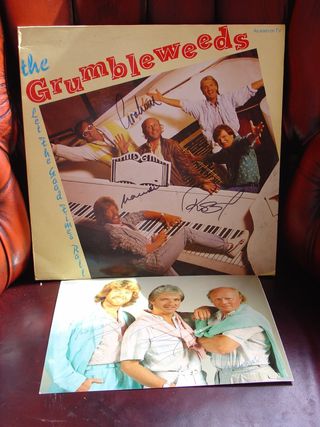This week a little part of the United Kingdom landed quite literally, on my foot.
It was cold and rainy Monday morning that my worldly possessions cleared US customs in New York and were delivered to the garage door of my house here in Philadelphia a few hours later. The box in question was bloody heavy slipped from my grasp as I was carrying it the short distance from the curbside to my house. It landed squarely on what shall now and forever be referred to as the swearing toe.
With everything inside, I apologised to the two delivery guys and a passing family that were frantically trying to stop their toddler repeating at the top of her lungs, some of the choicest words I had uttered.

Opening the legion of crates and boxes was an interesting experience. As with all possessions and indeed with almost everything in this world, there was a lot of useless wank but in and among the spare inner tubes, day-glo slippers and pickled seagulls, I found a number of boxes containing my vinyl albums and my record deck. Even though it was lunch time and my stomach was rumbling, I couldn’t resist wring up the deck and spinning a few choice records.
What immediately hit me (other than the fact that Paper Lace and The Grumbleweeds records don’t improve over time), was the scarcity of North American 70s progressive music in my collection. Sure I had the complete Rush discography up to Hold Your Fire, some of the iconic Zappa releases, a couple of Kansas titles, a Styx and early Chicago album, even a Triumph record but that was where things more or less ended.

This was a shock to me, so I decided to risk the wrath of my wife for neglecting my box opening duties and do a little Internet research to see what kind of native progressive bands were doing the rounds here in The States and Canada back in the days when prog was god.
The list, while varied and interesting, was not really extensive. Utopia for sure popped up, pop-proggers Ambrosia, the mellotron loving Cathedral, as did the largely forgotten but criminally underrated Yezda Urfa, but apart from that and the records of the bands I had above, the cupboard appeared to be pretty much bare.

Naturally if you know any better, let us know in the comments below. I like to read them while naked and oiled up in the shed at the bottom of the garden but don’t let that put you off.
Now I would be the first person to recognize that prog had in the 1970s, a very British biased heritage but the only conclusion I could come to was that at the time, North America was busy getting down to all the imported prog it could lay it’s hands on.
Today the indigenous Stateside progressive outfit is a lot more numerous, even if they do not all shift the kind of units their 70s brethren once did. The east coast boasts outfits like Dream Theater, Echolyn, Jolly and Thank You Scientist, the Midwest and South, Neal Morse, District 97, Sonus Umbra and Dream The Electric Sleep, the west coast, Spock’s Beard, Heliopolis and The Mercury Tree to name but a few I’ve seen face to face within the last year.
It is a good time to experience prog music, whatever country you happen to reside in. However, for someone like me who needs this music and would probably develop one of those facial ticks which would make you nervous if you stood next to me in a public toilet, it is a time of particularly great bounty here in these United States.
But all of the talk of prog wasn’t going to unpack all of my stuff. Besides, I needed to head on down to IKEA to buy a seagull display case.

They’re quite reasonably priced!!


